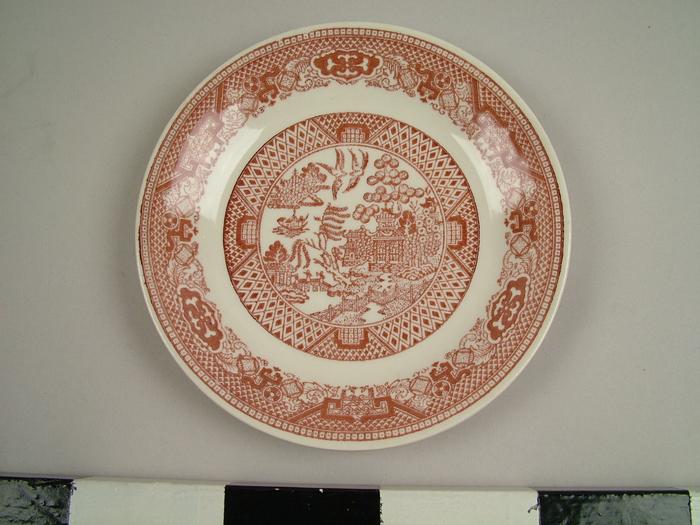Comments and Tags
Be the first to comment on this item!
Food and Drink
Decorative Arts ➔ Saucer
Identifier:
200461Description:
Ceramic saucer with red lattice designs around the edge and inner bowl. The center has a red colored landscape scene of buildings, people on a bridge, birds, trees, and a boat. The design is a depiction of the Willow Legend.;Willow Ware by Royal China;The design corresponds to the Willow Legend. According to the story, there was a Mandarin who had a beautiful daughter named Koong-se. Chang, who was the Mandarin's secretary, soon fell in love with his daughter. This angered the Mandarin since he regarding him as unworthy of his daughter. Chang was banished, and a fence was constructed from him ever seeing Koon-se again. Koong-se was thus limited to only walking in the gardens and on the water's edge. One day she found a shell fitted with sails that contained a poem and a bead which she gave to Chang, and thus she knew her love was close by. Koong-se was soon bethrothed to Ta-jin, a noble warrior Duke, and was full of despair. During a banquet, Chang, dressed as servant, sneaked into Koong-se's room and the two escaped across the bridge and stayed with a maid of Koong-se who was dismissed for conspiring with the lovers. Spies reported their location to the Mandarin and in attempt to escape Chang jumped in the river. He returned days later to take Koong-se saftly away to a distant island. Chang writtings there became popular, and the news spread to the Mandarin yet again. The Mandarin's guards killed him and Koong-se set herself and the house she was in on fire. The gods, touched by their loved, immortalised the two as doves, eternally flying together in the sky.Date:
circa 1920Materials:
Ceramic, CeramicDimensions:
0.75" hCurrent Location Status:
In StorageCollection Tier:
Tier 2Source:
Gift Of Dr. Ruth HerrickRelated Entities:
Royal Bavarian China (creator)Alternate names: Royal China Estate of Dr. Ruth Herrick (donor)
Born on July 6, 1895 in Ohio, Ruth Herrick became known as one of the first women physicians in Michigan. She studied at the University of Chicago Medical College and at Blodgett Memorial Hospital. Afterwards she began her practice in 1931 in Grand Rapids. She was an avid collector and took a strong interest in archaeology, having lectured at the Greenfield Village Museum and wrote and published a book entitled "Greentown glass: the Indiana Tumbler and Goblet Company and allied manufacturers (1959)". In 1961 she cooperated with the Kent County Medical Society in compiling a historic medical collection. She retired in 1973 and later passed away after an automobile accident on June 7, 1974, with many of her assets bequeathed to the Public Museum.
